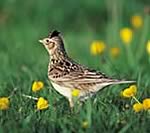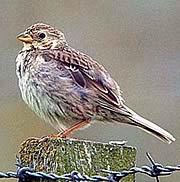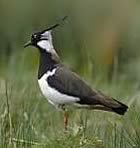 |
|||||||||
|
||||||||||||||||||||||
|
|
New Future for Farming
and Wildlife
|
|||||||||||||||||||||
 |
| Skylark |
The new scheme is the best chance to bring wildlife back to much of England's farmed countryside after three decades of population declines. Defra's Environmental Stewardship Scheme rewards farmers for wildlife-friendly practices and should offer a brighter future for some of the North East's best-loved birds, such as skylarks and lapwings.
Welcoming the launch of the scheme, RSPB North of England regional director, Andy Bunten, said: "It is great news that the people who are at the forefront of farmland conservation - the North East's farmers - can now all be rewarded for undertaking conservation management work.
"The Entry Level Scheme recognises that farmers have a vital role to play in safeguarding wildlife for everyone to enjoy, and that they need public support to carry out this important job. This scheme offers a great way for large numbers of farmers in northern England to help the fortunes of birds such as lapwing, skylark and corn bunting.
"The loss of wildlife from our countryside over the past 30 years means that the song of the skylark, the call of the corn bunting and the sight of farmland flowers are sadly just a distant memory for far too many people. This new scheme is a great opportunity to reverse the dramatic declines in the numbers of farmland birds across the country. We hope that many North East farmers will join this scheme and take this exciting new opportunity to protect our region's special landscape and its precious wildlife."
 |
| Corn Bunting |
Under the ELS scheme - which is the entry-level stage of the new Environmental Stewardship Scheme - farmers will be rewarded for maintaining environmental features and can choose from a range of farm management options that will benefit birds and other wildlife. The RSPB says that farmers in the north of England can use the Entry Level Scheme to make a big contribution to the conservation of several species of threatened birds.
Skylark populations declined by a third between 1994-2002. Upland farmers can help these birds using the management of permanent grassland with low inputs option, and in arable areas can leave small, unsown plots in their cereal fields for skylarks to feed and nest in through the summer. These simply created skylark squares have been proven to boost nesting opportunities for skylarks, increasing the number of chicks reared.
The population of corn buntings in the North East is now almost too small to measure. Nationally, numbers have plummeted by 88 per cent since 1970. ELS options that provide a year-round food supply, such as the Wild Bird Cover Crop, will hep these now rare birds
 |
| Lapwing |
Lapwings will benefit from the management of permanent grassland and rush pastures in upland areas that will maintain the short-grazed vegetation where lapwings nest
The RSPB has been closely involved in the design of Environmental Stewardship and has made all of its research about farmland bird conservation available to DEFRA. In order to get the most out of the scheme to help birds, farmers should choose measures which combine to give birds the best chances of surviving on their farm; these include over-winter food to help adult birds survive, chick food and a safe place to nest
The RSPB has produced a CD-Rom - Planning Your Entry Level Stewardship Application - to help farmers choose the best land management options for wildlife. The CD, developed in conjunction with the University of Hertfordshire, is a comprehensive guide to the whole ELS scheme, covering options on archaeology, landscape protection and resource protection, as well as wildlife.
Each year the RSPB works with more than 2,000 farmers, providing information about the birds on their farm and best practice advice on how they can help birds and other wildlife.

| property | organisations | site map
 Department for Environment Food and Rural Affairs |
